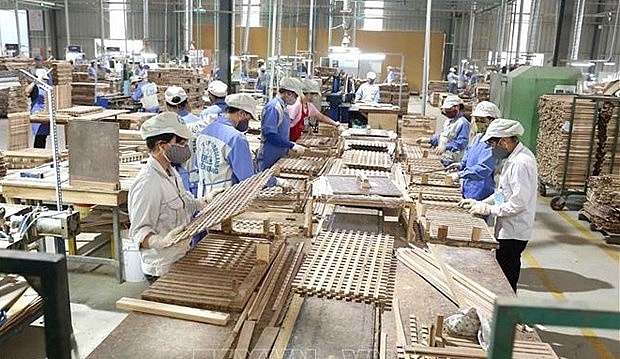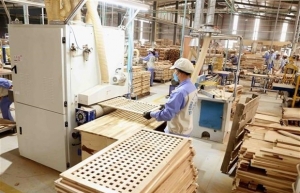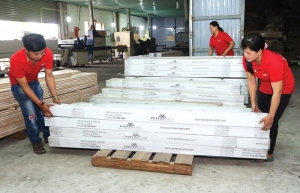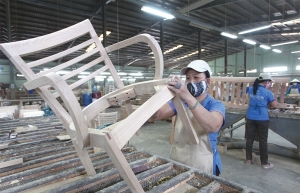EUDR imposes new regulations on timber exporters
The European Parliament approved the EU Deforestation Regulation (EUDR) to ban imports of coffee, beef, wood, and other commodities if they are linked to the destruction of the world’s forests.
 |
| EUDR imposes new regulations on timber exporters, Illustrative image (Source: VNA) |
The law will require companies that sell goods into the EU to produce a due diligence statement and verifiable information proving their goods were not grown on land deforested after 2020, or risk hefty fines.
The law needs formal approval from EU countries before it can enter into force. Once that happens, large companies would have 18 months to comply, and smaller firms 24 months.
According to the Ministry of Agriculture and Rural Development, the impact of this new agreement on Vietnam’s timber industry is equivalent to 1,400 afforestation households and 500,000 employees operating in more than 700 companies.
Dr. Nguyen Phu Hung, president of the Vietnam Forestry Association, said that exporters must explain three pieces of content in order to sell products on the EU market. First is gathering data on product type, quantity, geographical location, legality and status of deforestation, and forest degradation.
“Secondly, the risk assessment includes the presence of forests and indigenous peoples, consultation and cooperation with indigenous people, the existence of customary land claims, rates of deforestation, and the complexity of the supply chain. Third, risk mitigation may necessitate assistance for smallholders’ regulatory compliance,” Hung said.
According to Dr. Hung, difficulties exist for Vietnamese businesses because the location of Vietnam’s forests “has not been determined accurately” on the international coordinate system, and the database system of the forest area has not been completely and accurately compiled.
The EU is continually revising new technical import standards. In January, it announced a timeline for implementation of a due liability plan, mandating that all export partners to the EU devote more attention to environmental and labour issues.
Numerous exporters said that this move, coupled with a decline in orders due to low demand, has negatively impacted Vietnam’s wood exports. According to data from the General Department of Vietnam Customs, the export turnover of timber and wood products to the EU market in the first three months of 2023 is estimated to be $133.2 million, down 37.1 per cent from the same period in 2022.
Assoc. Prof. Dr. Tran Ba Ngai, vice president and general secretary of the Vietnam Forest Owners Association, told VIR that the EU wants to assure the legality of timber sources imported into the bloc.
“We should not be concerned about the new EU regulations because they are an inevitable component of the development process. Instead, companies must refine their mechanisms and policies to satisfy these needs.”
Ngai warns that the destruction of natural forests to create land for reforestation violates EUDR regulations. Vietnam and the EU previously signed the Volunteer Partnership Agreement on Forest Law Enforcement, Governance, and Trade, but accountability is low compared to the EUDR rules, Ngai said.
“Vietnam must evaluate the extent of the impact of forest-derived timber on the natural forest. It already has the Timber Legality Assurance System, so verifying the origin of wood products is relatively straightforward. However, it needs further improvement to satisfy the EU’s new requirements,” Ngai added.
The EUDR rules aim to eliminate deforestation from the supply chains of a range of everyday items sold in Europe. It will apply to soy, beef, palm oil, wood, cocoa, coffee, rubber, charcoal, and derived products including leather, chocolate, and furniture.
Deforestation is responsible for about 10 per cent of global greenhouse gas emissions that drive climate change.
| In 2022, EU imports of wooden furniture reached 7.3 million metric tonnes and were valued at $26.3 million, a decrease of 7 per cent in volume but an increase of 6.6 per cent in value compared to 2021. Vietnam is the fifth-largest supplier of wooden furniture to the EU in 2022, reaching 140,500 MT and worth $734 million, an increase of 3 per cent in volume and 38 per cent in value over 2021. However, just 1.9 per cent of the total value of wooden furniture imports into the EU come from Vietnam.Source: Eurostat |
| Key provisions of the EUDR The regulation prohibits companies from placing on the EU market any pertinent commodities or products that contribute to deforestation (or degradation in forestry) or are of illicit origin. Businesses must conduct due diligence to ensure that their products are not deforested (or, in the case of timber, degraded) and are sourced legally. Before companies can import, they must demonstrate that there is no or a negligible risk that noncompliance will lead to deforestation or forest degradation. The competent authorities in each EU member state will conduct compliance reviews and penalise companies that do not comply. |
 | Vietnam to grant FLEGT licence to wood exports in 2025 Vietnam is set to grant a licence under the Voluntary Partnership Agreement/FAO-EU Forest Law Enforcement, Governance and Trade (FLEGT) Programme to wood exports in 2025, after it completes preparing necessary conditions, reported a government official familiar with the sector. |
 | Vietnam plans out domestic wood pivot To ease the dependence on imported wood and timber products, Vietnam aims to reduce the amount of imported material and instead strengthen the domestic supply – a goal the government aims to reach by applying a traditional carrot and stick approach. |
 | Strengthening Vietnam's wood industry Vietnam is working to establish a legal supply chain to become a global leader in the processing and export of wood. |
 | Artisan communities strive for legal wood Many wood artisans are in need of support so that their works can get recognition in the global supply chain. |
What the stars mean:
★ Poor ★ ★ Promising ★★★ Good ★★★★ Very good ★★★★★ Exceptional
Related Contents
Latest News
More News
- State corporations poised to drive 2026 growth (February 03, 2026 | 13:58)
- Why high-tech talent will define Vietnam’s growth (February 02, 2026 | 10:47)
- FMCG resilience amid varying storms (February 02, 2026 | 10:00)
- Customs reforms strengthen business confidence, support trade growth (February 01, 2026 | 08:20)
- Vietnam and US to launch sixth trade negotiation round (January 30, 2026 | 15:19)
- Digital publishing emerges as key growth driver in Vietnam (January 30, 2026 | 10:59)
- EVN signs key contract for Tri An hydropower expansion (January 30, 2026 | 10:57)
- Vietnam to lead trade growth in ASEAN (January 29, 2026 | 15:08)
- Carlsberg Vietnam delivers Lunar New Year support in central region (January 28, 2026 | 17:19)
- TikTok penalised $35,000 in Vietnam for consumer protection violations (January 28, 2026 | 17:15)

 Tag:
Tag:




















 Mobile Version
Mobile Version